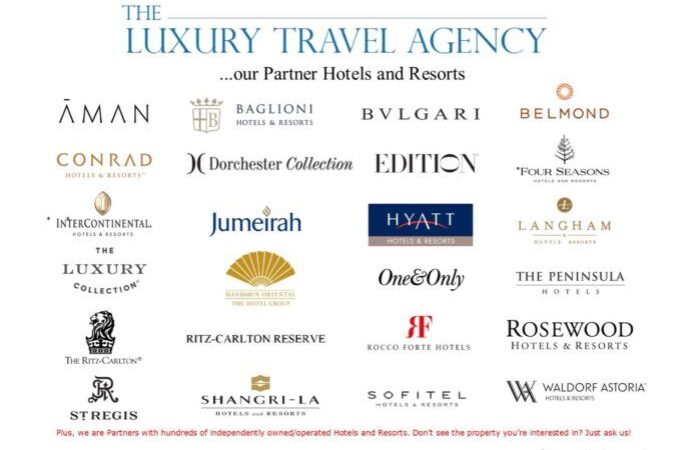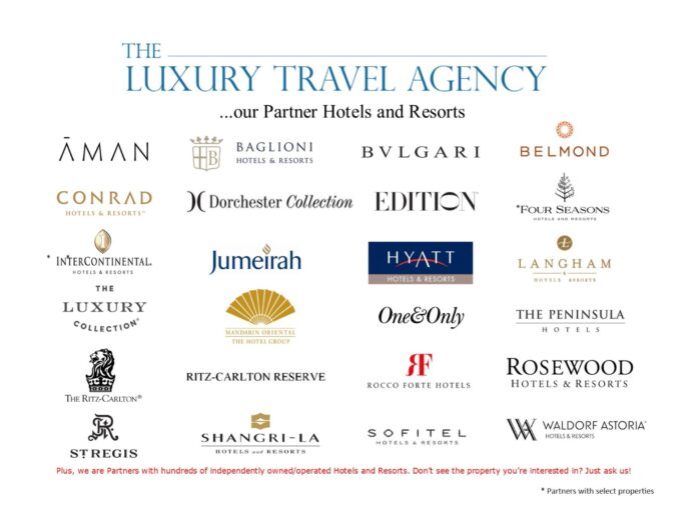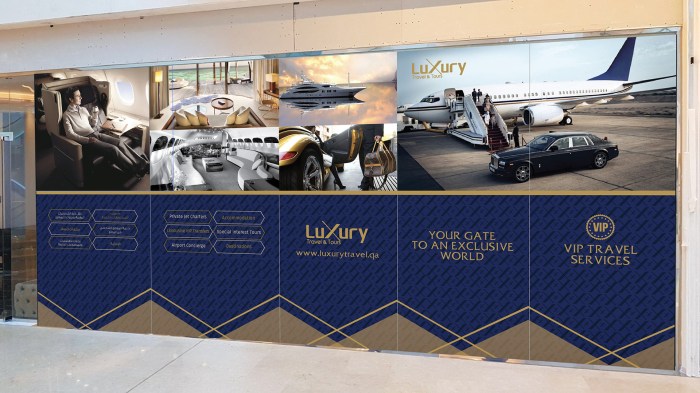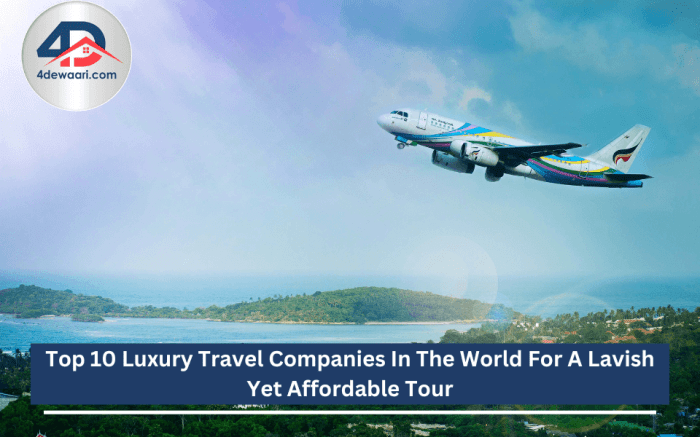Luxury Tour Operators: Crafting Unforgettable Experiences

Luxury tour operators specialize in crafting bespoke travel experiences, catering to discerning travelers seeking unparalleled service, comfort, and exclusivity. These operators go beyond the ordinary, offering personalized itineraries, curated accommodations, and access to unique destinations and experiences.
From private jets to five-star hotels, luxury tour operators curate every detail of their clients’ journeys, ensuring a seamless and memorable experience. Their focus is on providing exceptional service, exceeding expectations, and creating lasting memories for their discerning clientele.
Defining Luxury Tour Operators
Luxury tour operators are a distinct category within the travel industry, offering curated experiences that cater to discerning travelers seeking unparalleled comfort, exclusivity, and personalized service. They stand apart from standard travel agencies by prioritizing a high level of bespoke service, exceptional amenities, and access to unique destinations and experiences.
Services and Experiences Offered by Luxury Tour Operators
Luxury tour operators go beyond the typical travel agency offerings, providing a comprehensive and immersive experience. They curate itineraries tailored to individual preferences, often including:
- Private transportation: Luxury vehicles, private jets, and helicopters for seamless and exclusive travel.
- Luxurious accommodations: Handpicked accommodations ranging from five-star hotels to private villas and exclusive resorts.
- Personalized itinerarie s: Customized travel plans that align with specific interests and desires, including unique activities and experiences.
- Concierge services: Dedicated staff to handle all travel arrangements, from restaurant reservations to securing tickets to exclusive events.
- Expert guides: Knowledgeable and experienced guides who provide insightful commentary and enhance the travel experience.
- Exceptional dining experiences: Access to Michelin-starred restaurants, private chef services, and exclusive culinary tours.
- Unique experiences: Opportunities to engage in exclusive activities like private wine tastings, behind-the-scenes tours, and private concerts.
Target Audience and Their Needs and Expectations
The target audience for luxury tour operators consists of high-net-worth individuals and discerning travelers seeking a premium travel experience. They value exclusivity, personalized service, and access to unique experiences. Their expectations include:
- Seamless and effortless travel: Minimal hassle and stress throughout the journey, with every detail taken care of.
- Unparalleled comfort and luxury: Access to the finest accommodations, amenities, and services.
- Personalized attention and service: Dedicated staff who cater to individual needs and preferences.
- Unique and authentic experiences: Opportunities to explore hidden gems and engage in exclusive activities.
- Value for money: A premium experience that justifies the higher price point.
Key Aspects of Luxury Travel
Luxury travel is more than just a vacation; it’s an experience designed to indulge every sense and create lasting memories. It encompasses a curated blend of high-quality accommodations, seamless travel arrangements, personalized service, and exquisite culinary experiences. This section delves into the key aspects that define luxury travel and distinguish it from ordinary tourism.
Accommodation
Luxury accommodations are the foundation of a truly indulgent travel experience. These properties go beyond basic comfort and provide a sanctuary of unparalleled luxury.
- Exceptional Design and Amenities: Luxury hotels and resorts are renowned for their meticulous design, often featuring stunning architecture, opulent décor, and state-of-the-art amenities. From private pools and expansive balconies to world-class spas and gourmet dining, these properties offer a range of services tailored to the discerning traveler.
- Personalized Service: Luxury accommodations prioritize personalized service, catering to the unique needs and preferences of each guest. This may include dedicated concierge services, tailored room amenities, and personalized itineraries.
- Privacy and Exclusivity: Luxury hotels and resorts often offer a sense of privacy and exclusivity, with limited guest capacity and private areas designed for relaxation and rejuvenation. This may include secluded villas, private beaches, and exclusive access to amenities.
Transportation
Luxury travel involves seamless and comfortable transportation, elevating the journey itself into an unforgettable experience.
- Private Jets and Helicopters: For ultimate convenience and privacy, luxury travelers may opt for private jets or helicopters. These modes of transportation offer unparalleled flexibility, allowing for direct flights to remote destinations and avoiding the hassles of commercial air travel.
- Luxury Cars and Limousines: Luxury vehicles are a hallmark of upscale travel, providing comfort, style, and personalized service. Whether it’s a chauffeured limousine or a high-end sports car, these vehicles enhance the travel experience and add a touch of sophistication.
- Private Yachts and Cruise Ships: For those seeking an immersive maritime experience, private yacht,s and luxury cruise ships offer unparalleled elegance and exclusivity. These vessels provide access to pristine waters, private islands, and secluded destinations, catering to the discerning traveler’s desire for adventure and relaxation.
Dining
Culinary experiences are an integral part of luxury travel, offering a symphony of flavors and a celebration of gastronomy.
- Michelin-Starred Restaurants: Luxury travel often involves dining at Michelin-starred restaurants, where renowned chefs create culinary masterpieces using the finest ingredients and innovative techniques. These dining experiences are a testament to the art of gastronomy and a highlight of any luxury itinerary.
- Private Chefs and Culinary Tours: For a more intimate and personalized dining experience, luxury travelers may engage private chefs or participate in culinary tours. These experiences provide an opportunity to explore local cuisine, learn new cooking techniques, and savor authentic flavors.
- Wine and Spirits: Luxury travel often includes curated wine and spirits experiences, featuring exclusive tastings, cellar tours, and private wine dinners. These events allow travelers to indulge in the world’s finest wines and spirits, learning about their history, production, and nuances.
Personalized Service and Attention to Detail
Personalized service and meticulous attention to detail are hallmarks of luxury travel, creating an experience tailored to the individual’s preferences and desires.
- Concierge Services: Luxury travel providers offer dedicated concierge services to anticipate and fulfill every need of their clients. From booking exclusive experiences to arranging private transportation, these services ensure a seamless and effortless journey.
- Tailored Itineraries: Luxury travel is all about creating bespoke experiences. Travel operators work closely with their clients to design personalized itineraries that align with their interests, preferences, and time constraints.
- Exceptional Customer Care: Luxury travel providers go above and beyond to ensure customer satisfaction, offering 24/7 support and responding to every request with promptness and professionalism. This dedication to exceptional customer care creates a sense of trust and loyalty.
Business Model and Operations
Luxury tour operators employ a distinctive business model that caters to the unique demands of high-end travelers. This model revolves around delivering personalized experiences, exceptional service, and curated itineraries that go beyond the ordinary.
Revenue Streams and Profit Margins
The revenue streams for luxury tour operators are diverse and often involve a combination of direct sales, partnerships, and commissions. The primary sources of income include:
- Tour Packages: These are the core revenue generators, encompassing pre-designed itineraries that include accommodation, transportation, activities, and meals. Luxury tour packages are often priced at a premium, reflecting the high-quality services and exclusive experiences offered.
- Accommodation: Luxury tour operators often have partnerships with high-end hotels, resorts, and villas, earning commissions on bookings or securing preferential rates for their clients. These partnerships ensure a seamless travel experience and access to exclusive properties.
- Activities and Experiences: Curated activities, private tours, and bespoke experiences are integral to luxury travel. Tour operators earn revenue through commissions from activity providers or by charging directly for these services. These activities can range from private helicopter tours to exclusive wine tastings and private concerts.
- Concierge Services: Luxury tour operators often provide concierge services, assisting clients with travel arrangements, securing reservations, and fulfilling specific requests. These services generate revenue through fees or commissions.
Profit margins in the luxury travel industry are generally higher than in mass tourism. This is attributed to the higher pricing of luxury tours, the limited competition in the niche market, and the focus on providing personalized and high-value services.
However, it is important to note that profit margins can vary significantly depending on factors such as the size and scale of the operator, the geographic focus, and the specific offerings.
Operational Challenges and Opportunities
Luxury tour operators face a unique set of challenges and opportunities in their operations:
- Maintaining High Service Standards: Delivering exceptional service is paramount in luxury travel. Tour operators must invest in highly trained staff, ensure meticulous attention to detail, and consistently exceed client expectations. This requires careful staff selection, ongoing training, and a strong focus on quality control.
- Managing Client Expectations: Luxury travelers have high expectations for personalization, exclusivity, and seamless experiences. Tour operators must understand and anticipate client needs, providing tailored itineraries, bespoke services, and proactive communication. This requires strong communication skills, cultural sensitivity, and a deep understanding of the luxury market.
- Building Trust and Reputation: Trust is essential in luxury travel. Tour operators must build a strong reputation for reliability, quality, and discretion. This can be achieved through positive client testimonials, industry awards, and strategic marketing efforts that emphasize the value proposition of luxury travel.
- Managing Costs and Profitability: Balancing high-quality services with profitability is a key challenge. Tour operators must carefully manage operational costs, negotiate favorable partnerships, and optimize pricing strategies to ensure financial sustainability. This requires a strong understanding of market dynamics, cost management techniques, and revenue optimization strategies.
“The luxury travel market is driven by a desire for unique, personalized, and unforgettable experiences. Tour operators must cater to these demands while maintaining high service standards and ensuring profitability.”
Market Trends and Innovations

The luxury travel market is constantly evolving, driven by changing consumer preferences, technological advancements, and a growing awareness of sustainability. Luxury tour operators need to stay ahead of these trends and adapt their offerings to meet the demands of discerning travelers.
Impact of Technology and Digitalization
Technology has revolutionized the luxury travel industry, empowering travelers with greater control over their experiences and providing tour operators with new ways to reach their target audience.
- Personalized Experiences: Luxury travelers are increasingly seeking bespoke and personalized experiences. Technology enables tour operators to gather data on traveler preferences, travel history, and interests to create customized itineraries and recommendations. For example, using artificial intelligence (AI) to analyze customer data and create personalized travel itineraries, based on their interests, preferences, and budget, allowing for more tailored experiences.
- Enhanced Booking and Payment: Online booking platforms and mobile apps have made it easier than ever for travelers to research, book, and pay for their luxury trips. This has increased transparency and efficiency, allowing travelers to compare options and make informed decisions. The use of blockchain technology ensures secure and transparent transactions, eliminating the need for intermediaries and reducing transaction fees, leading to more efficient and cost-effective bookings.
- Virtual Reality and Augmented Reality (VR/AR): VR/AR technologies are transforming the way luxury tour operators showcase their destinations and experiences. VR tours allow potential travelers to virtually explore hotels, resorts, and attractions, providing a realistic preview of what they can expect. VR experiences can immerse potential clients in a destination’s sights and sounds, allowing them to experience the atmosphere and culture virtually, and fostering a sense of anticipation and excitement for their future trip.
Growing Demand for Sustainable and Responsible Luxury Travel, Luxury tour operators
Luxury travelers are increasingly aware of their environmental impact and are seeking out sustainable and responsible travel options.
- Eco-conscious Tourism: Luxury tour operators are incorporating sustainable practices into their operations, such as using renewable energy sources, reducing waste, and supporting local communities. This includes partnering with eco-friendly hotels and resorts, offering tours that prioritize conservation efforts, and supporting local artisans and businesses.
- Responsible Tourism: Luxury travelers are seeking experiences that minimize their impact on the environment and support local communities. This includes choosing destinations that prioritize sustainability and cultural preservation, engaging in responsible activities like wildlife viewing and cultural immersion, and supporting local businesses and communities through fair trade practices.
- Wellness and Wellbeing: Luxury travelers are prioritizing their health and well-being, seeking experiences that promote relaxation, rejuvenation, and self-discovery. This includes incorporating mindfulness practices, healthy cuisine, and access to spa and wellness facilities into their travel itineraries. Luxury tour operators are integrating wellness retreats, yoga and meditation experiences, and healthy dining options into their offerings, catering to the growing demand for holistic travel experiences.
Marketing and Branding
Luxury tour operators need to implement effective marketing strategies to attract high-end clients and differentiate themselves in a competitive market. Building a strong brand identity and managing reputation are crucial for success in the luxury travel sector.
Importance of Branding and Reputation Management
Branding and reputation management are paramount for luxury tour operators, as they directly influence customer perception and loyalty. A strong brand identity helps establish a unique position in the market, attracting discerning travelers seeking exclusive experiences and exceptional service. Reputation management, on the other hand, focuses on building and maintaining positive online and offline feedback, ensuring a consistent and positive image.
- Brand Identity: A well-defined brand identity encompasses elements such as logos, colors, fonts, messaging, and values. Luxury tour operators should strive to create a brand that reflects exclusivity, sophistication, and a commitment to personalized experiences. For instance, a tour operator specializing in private jet travel might use sleek, modern visuals and emphasize personalized itineraries and curated experiences.
- Reputation Management: Positive online reviews and testimonials are crucial for building trust and credibility. Luxury tour operators should actively monitor online platforms such as TripAdvisor, Google Reviews, and social media for feedback and address any negative reviews promptly and professionally. Building relationships with travel bloggers and influencers can also contribute to a positive reputation.
Social Media and Digital Marketing Strategies
Social media and digital marketing channels play a significant role in reaching luxury travelers. These platforms offer targeted advertising options, allowing tour operators to connect with affluent individuals based on demographics, interests, and travel preferences.
- Targeted Advertising: Platforms like Facebook, Instagram, and LinkedIn offer sophisticated targeting options based on factors such as income, location, interests, and travel history. This allows tour operators to reach a highly relevant audience with tailored marketing messages.
- Content Marketing: Creating high-quality, visually appealing content such as travel blogs, destination guides, and behind-the-scenes videos can attract and engage luxury travelers. Content should focus on showcasing unique experiences, luxury accommodations, and exclusive access to destinations.
- Influencer Marketing: Collaborating with travel influencers who align with the brand’s values and target audience can amplify reach and generate trust among potential clients. Influencers can create authentic and engaging content featuring the tour operator’s services and destinations.
Effective Marketing Strategies for High-End Clients
Luxury tour operators can employ a variety of marketing strategies to attract high-end clients:
- Personalized Marketing: Luxury travelers appreciate personalized experiences. Tour operators should gather information about client preferences, such as destination interests, travel styles, and budget, to tailor marketing messages and offers. This can be achieved through email marketing, personalized website experiences, and concierge services.
- Exclusive Events and Experiences: Hosting private events, VIP receptions, and curated travel experiences can create exclusive opportunities for high-end clients to interact with the brand and experience its offerings firsthand. This can involve showcasing luxury accommodations, introducing bespoke itineraries, or offering exclusive access to private events or destinations.
- Partnerships and Collaborations: Collaborating with luxury brands, hotels, airlines, and other travel-related businesses can provide access to a wider audience and create opportunities for cross-promotion. This can involve joint marketing campaigns, exclusive packages, and loyalty programs.
Future of Luxury Travel

The luxury travel sector, known for its bespoke experiences and exclusive offerings, is poised for continued growth, albeit with a shifting landscape shaped by evolving consumer preferences, technological advancements, and global trends.
Emerging Trends and Challenges
The future of luxury travel will be marked by a confluence of trends and challenges. While demand for luxury experiences remains strong, operators will need to adapt to cater to a discerning clientele with evolving expectations.
- Personalized Experiences: Luxury travelers increasingly seek highly personalized experiences tailored to their unique interests and preferences. This will necessitate a move away from standardized itineraries towards curated journeys that cater to individual needs and desires. For example, a luxury tour operator might offer bespoke itineraries that include private art tours, exclusive culinary experiences, or access to hidden gems based on the traveler’s passions.
- Sustainability and Ethical Travel: Sustainability and ethical considerations are gaining prominence among luxury travelers. Operators will need to prioritize environmentally friendly practices, support local communities, and promote responsible tourism. This could involve partnering with eco-conscious hotels, offering carbon-offsetting options, or supporting local artisans and businesses.
- Technology and Innovation: Technology will continue to play a crucial role in shaping the luxury travel experience. Artificial intelligence (AI) can be used to personalize itineraries, virtual reality (VR) can offer immersive previews of destinations, and mobile apps can provide real-time travel updates and concierge services.For example, a luxury tour operator might use AI-powered chatbots to provide 24assistancee to travelers or offer VR experiences to showcase the beauty of a destination before booking.
- Wellness and Wellbeing: Wellness travel is a growing segment within the luxury market. Travelers are increasingly seeking experiences that prioritize their physical and mental well-being. This could involve incorporating yoga retreats, spa treatments, and healthy dining options into luxury itineraries.
- Experiential Travel: The focus on experiences over material possessions is driving demand for immersive and authentic travel. Luxury tour operators will need to offer unique and memorable experiences that go beyond simply visiting tourist attractions. This could involve private cooking classes, behind-the-scenes tours, or encounters with local communities.
Impact of Global Events and Economic Factors
The luxury travel market is not immune to global events and economic factors. The COVID-19 pandemic, for instance, significantly impacted travel patterns and preferences. Luxury tour operators need to be prepared to navigate potential disruptions and adapt their strategies accordingly.
- Economic Fluctuations: Economic downturns can impact spending on luxury travel. Operators will need to be mindful of economic conditions and offer flexible payment options or value-driven packages to attract discerning travelers. For example, a luxury tour operator might offer early bird discounts or payment plans to make luxury travel more accessible during periods of economic uncertainty.
- Geopolitical Instability: Political instability and security concerns can affect travel destinations. Luxury tour operators need to be aware of geopolitical risks and offer alternative itineraries or travel insurance options to provide peace of mind to their clients. For instance, a luxury tour operator might offer alternative itineraries in regions with political instability or provide travel insurance that covers disruptions due to geopolitical events.
- Climate Change: Climate change is leading to extreme weather events and environmental changes that can disrupt travel plans. Luxury tour operators need to consider the impact of climate change on their operations and offer sustainable and resilient travel options. This could involve choosing destinations less affected by climate change, offering carbon offsetting options, or supporting initiatives to mitigate the impact of climate change.
Strategic Roadmap for Luxury Tour Operators
To thrive in the evolving landscape of luxury travel, operators need to adopt a strategic roadmap that embraces innovation, personalization, and sustainability.
- Embrace Technology: Leverage technology to enhance the customer experience, from personalized itineraries to AI-powered chatbots. This will allow operators to provide seamless and efficient service, cater to individual preferences, and offer immersive experiences.
- Focus on Experiences: Shift from simply providing accommodation and transportation to curating unforgettable experiences that connect travelers with local cultures, nature, and themselves. This could involve partnering with local artisans, offering private tours, or creating unique itineraries that cater to specific interests.
- Prioritize Sustainability: Adopt sustainable practices throughout the entire travel journey, from eco-friendly hotels to responsible tourism initiatives. This will attract environmentally conscious travelers and contribute to the preservation of destinations.
- Build Strong Relationships: Cultivate strong relationships with clients, offering personalized service and building trust. This will foster loyalty and encourage repeat business. Operators can achieve this through tailored communication, personalized itineraries, and ongoing engagement with clients.
- Stay Agile and Adaptable: The travel industry is constantly evolving. Luxury tour operators need to be agile and adaptable, responding to changing trends and customer preferences. This requires staying informed about industry developments, monitoring market trends, and being willing to experiment with new ideas.
Wrap-Up: Luxury Tour Operators

The world of luxury travel is constantly evolving, with new trends and innovations emerging to cater to the ever-changing demands of high-end travelers. Luxury tour operators play a crucial role in this landscape, providing curated experiences that blend exclusivity, personalized service, and unforgettable moments.
As the industry continues to grow, luxury tour operators will remain at the forefront, shaping the future of travel and creating extraordinary journeys for their discerning clientele.
Comments are closed.